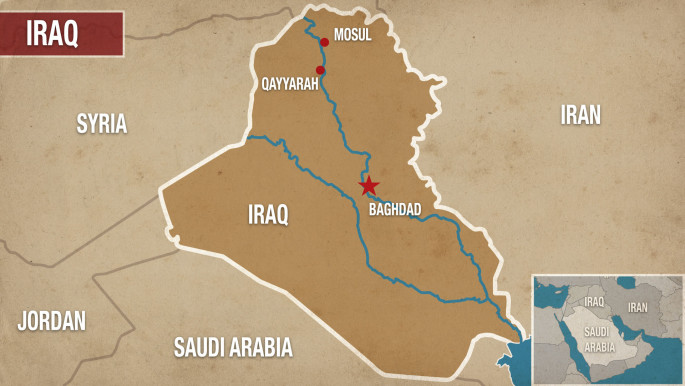'An end for Islamic State': Iraqi PM hails victory over 'brutality and terrorism' in Mosul
Iraqi Prime Minister Haider al-Abadi declared victory over "brutality and terrorism" in Mosul on Monday, announcing his forces have ended the Islamic State group's rule over the country's second city.
Standing with members of the security forces, Abadi hailed the retaking of Mosul – where IS dealt Iraqi troops a devastating defeat three years ago – as a key moment in the war against the extremists.
"Our victory today is a victory over darkness, a victory over brutality and terrorism, and I announce here... to the whole world today the end and failure and collapse of the mythical terrorist Daesh state," Abadi said in a televised address from west Mosul, using an Arabic acronym for IS.
"These operations were carried out by Iraqi planning and success and implementation," Abadi said, while also thanking "all the countries that stood with Iraq in its war against terrorism."
Dozens of members of the security forces erupted into cheers after he spoke, dancing and waving flags and their weapons as they celebrated.
The US-led coalition that backed the Mosul offensive and is supporting another assault on IS's Syrian bastion Raqqa hailed the victory, but warned it did not mark the end of the war against the extremists.
"This victory alone does not eliminate (IS) and there is still a tough fight ahead. But the loss of one of its twin capitals and a jewel of their so-called caliphate is a decisive blow," said Lieutenant General Stephen Townsend, the commander of the international anti-IS operation.
"Now it is time for all Iraqis to unite to ensure (IS) is defeated across the rest of Iraq," Townsend said.
US President Donald Trump also praised the victory, saying it was a signal that IS's "days in Iraq and Syria are numbered".
But rebuilding the shattered city of Mosul and helping civilians will be a huge task, and aid groups warn that Iraq's humanitarian crisis is far from over.
Devastation in Old City
Mosul's Old City in particular has been devastated, with many buildings reduced to little more than concrete shells and rubble littering the streets.
Twitter Post
|
Abadi said that as well as continuing to tackle IS, Iraq had other challenges including "the mission of stabilisation and the mission of building".
Iraqi forces launched their campaign in October to retake Mosul, which was seized by the group during the mid-2014 offensive that saw them take control of large parts of Iraq and neighbouring Syria.
Army, police and special forces, backed by waves of US-led airstrikes, seized the eastern side of the city in January and launched the battle for its western part the next month.
The fight grew tougher when security forces entered the densely populated Old City on the western bank of the Tigris River, which divides the city, and intense street-to-street fighting followed.
The cost of victory has been enormous: much of Mosul in ruins, thousands dead and wounded and nearly half the city's population forced from their homes.
The United Nations has said 920,000 people fled their homes during the Mosul operation, and while some have returned the vast majority remain displaced.
'Nothing to go back to'
Amnesty International on Tuesday called for a commission to investigate crimes against civilians in Mosul by all sides in the battle to liberate the Iraqi city from extremists.
 |
"The horrors that the people of Mosul have witnessed and the disregard for human life by all parties to this conflict must not go unpunished," said Lynn Maalouf, director of Middle East research at Amnesty International.
The UN refugee agency said it could be many months before civilians are able to return to their homes.
"Many have nothing to go back to due to extensive damage caused during the conflict, while key basic services such as water, electricity and other key infrastructure, including schools and hospitals, will need to be rebuilt or repaired," said the UNHCR.
Twenty-eight aid groups working in Iraq issued a joint call for international support for rebuilding efforts and urged authorities not to press civilians to return.
![Mosul victory [AFP] Mosul victory [AFP]](/sites/default/files/styles/large_16_9/public/media/images/F2EE5823-8922-4872-983C-EFB9307B663F.jpg?h=d1cb525d&itok=Nuok99Ln)


